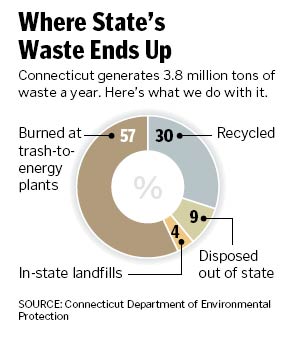 |
 |
|||
|
||||
| Web Sites, Documents and Articles >> Hartford Courant News Articles > | ||
|
Recycling Needs A Pickup December 29, 2006 Connecticut will have to almost double its recycling rate - from 30 percent to 58 percent - just to keep up with increasing amounts of waste and changing lifestyles over the next 20 years. That ambitious goal is the cornerstone of a new Solid Waste Management Plan released Thursday by the state Department of Environmental Protection. The plan - the first significant amendment to the state's basic waste management plan in 15 years - is the result of a year of study by state environmental officials after lengthy consultations with consumer groups, town governments and industry groups.
"We have the same problem with solid waste management as we have with all environmental issues," McCarthy said Thursday. "There's a comfort level that we all have because so many of us feel that we've already done so much with recycling. But the problem keeps leaping ahead of us and, in fact, recycling rates have basically remained flat at 30 percent over the past five years. "Meanwhile there's a whole new range of products - particularly cellphones, computers and other electronics - that are becoming a larger component of what we throw away every year. Only the most aggressive and farsighted action can allow us to catch up." Connecticut generates about 3.8 million tons of solid waste a year. About 30 percent of that is recycled by commercial trash haulers and town recycling centers. Fifty-seven percent is burned at six regional trash-to-energy plants; 9 percent is disposed out of state and 4 percent is disposed at landfills. Meanwhile, the growth in everything from restaurant and fast-food dining to DVD and laptop sales is increasing the garbage flow every year. At current rates of growth, the new Solid Waste Management Plan says, the state will produce 5.2 million tons of municipal solid waste a year by 2024. But if current recycling rates remain stagnant, the state will be inundated with an increase of almost 1 million tons a year from present levels. "The bottom line is that, right now, the average person in Connecticut generates about 1.09 tons of municipal solid waste a year," said Bob Kaliszewski, the director of planning and program development at DEP who coordinated the effort to revise the state's plan. "Our goal is to get that figure down to 0.6 ton a year." The new plan offers 75 strategies to dramatically reduce solid waste, one of which is conducting a detailed "waste characterization study." Among other findings, Kaliszewski said, the study will help the state identify just how much commercial organic waste from restaurants, fast-food franchises and commercial cafeterias reaches trash-to-energy plants a year. Diverting that to commercial compost companies and even animal farms for feed could significantly reduce the amount of liquids reaching the trash-to-energy plants and thus make them more efficient. Although many towns in Connecticut now recycle plastics labeled "1" and "2," recycling those plastics is not required. Many towns still don't recycle magazines, food boxes and catalogs. Legislation would be required to mandate this recycling, but the state first wants to study how to make such steps easier and more cost efficient for towns. McCarthy and Kaliszewski also said it's overly simplistic to expect major industries contributing to the waste stream to fight enhanced recycling efforts, as indeed the beverage industry has fought "bottle bills" in the past. In many states, including Connecticut, computer giants like Dell and Hewlett-Packard are offering consumers an opportunity to ship their used computers and components back to the manufacturer for recycling, or sponsoring weekend pickup drives that divert computers from entering the garbage stream. McCarthy said the state will work with major electronics manufacturers to remove hazardous materials like lead from their products so recycling is easier and safer. "No one wants to live next door to landfills, and waste-to-energy plants are enormously costly facilities to expand," McCarthy said. "Our challenge to manufacturers will be for them to support recycling and take responsibility for the materials they are placing in the waste chain. That way we're leading a world where we're all intelligently managing the problems our success creates."
|
||
| Last update:
September 25, 2012 |
|
||
|
 The new plan also represents a continuation of the aggressive environmental management policies advocated by DEP Commissioner Gina McCarthy, who has frequently spoken out on issues of development, urban sprawl and clean air and water since her appointment by Gov. M. Jodi Rell two years ago.
The new plan also represents a continuation of the aggressive environmental management policies advocated by DEP Commissioner Gina McCarthy, who has frequently spoken out on issues of development, urban sprawl and clean air and water since her appointment by Gov. M. Jodi Rell two years ago.